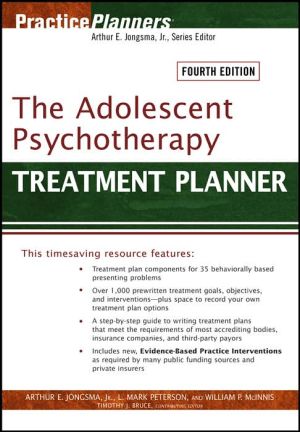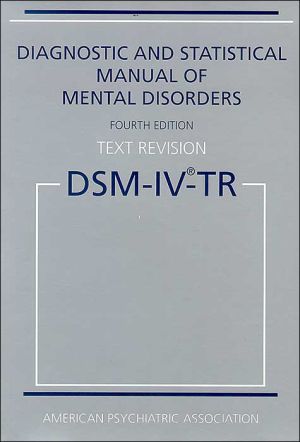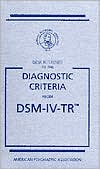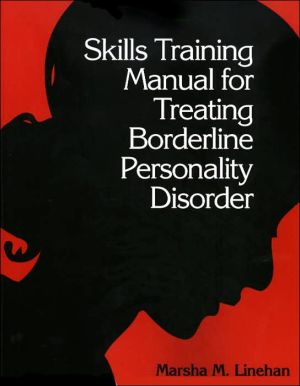The Adolescent Psychotherapy Treatment Planner
The Adolescent Psychotherapy Treatment Planner, Fourth Ediiton provides treatment planning guidelines and an array of pre-written treatment plan components for behavioral and psychological problems, including anger management, blended family conflicts, low self-esteem, chemical dependence, eating disorders, and sexual acting out. Clinicians with adolescent clients will find this up-to-date revision an invaluable resource.\ \ \ Provides treatment planning guidelines and...
Search in google:
The Adolescent Psychotherapy Treatment Planner, Fourth Edition provides all the elements necessary to quickly and easily develop formal treatment plans that satisfy the demands of HMOs, managed care companies, third-party payors, and state and federal agencies. New edition features empirically supported, evidence-based treatment interventionsOrganized around 35 main presenting problems, from eating disorders and low self-esteem to suicidal ideation, sexual acting out, and chemical dependenceOver 1,000 prewritten treatment goals, objectives, and interventions—plus space to record your own treatment plan optionsEasy-to-use reference format helps locate treatment plan components by behavioral problemDesigned to correspond with the newest editions of The Adolescent Psychotherapy Progress Notes Planner and Adolescent Psychotherapy Homework PlannerIncludes a sample treatment plan that conforms to the requirements of most third-party payors and accrediting agencies (including CARF, JCAHO, and NCQA) Additional resources in the PracticePlanners® series: Progress Notes Planners contain complete, prewritten progress notes for each presenting problem in the companion Treatment Planners. Homework Planners feature behaviorally based, ready-to-use assignments to speed treatment and keep clients engaged between sessions. For more information on our PracticePlanners® products, including our full line of Treatment Planners, visit us on the Web at: www.wiley.com/practiceplanners
PRACTICEPLANNERS ® SERIES PREFACE\ The practice of psychotherapy has a dimension that did not exist 30, 20, or even 15 years ago--accountability. Treatment programs, public agencies, clinics, and even group and solo practitioners must now justify the treatment of patients to outside review entities that control the payment of fees. This development has resulted in an explosion of paperwork.\ Clinicians must now document what has been done in treatment, what is planned for the future, and what the anticipated outcomes of the interventions are. The books and software in this PracticePlanners series are designed to help practitioners fulfill these documentation requirements efficiently and professionally.\ The PracticePlanners series is growing rapidly. It now includes not only the original Complete Adult Psychotherapy Treatment Planner, third edition; The Child Psychotherapy Treatment Planner, third edition; and The Adolescent Psychotherapy Treatment Planner, third edition, but also Treatment Planners targeted to specialty areas of practice, including: addictions, juvenile justice/residential care, couples therapy, employee assistance, behavioral medicine, therapy with older adults, pastoral counseling, family therapy, group therapy, neuropsychology, therapy with gays and lesbians, special education, school counseling, and more.\ Several of the Treatment Planner books now have companion Progress Notes Planners (e.g., Adult, Adolescent, Child, Addictions, Severe and Persistent Mental Illness). More of these planners that provide a menu of progress statements that elaborate on the client's symptompresentation and the provider's therapeutic intervention are in production. Each Progress Notes Planner statement is directly integrated with "Behavioral Definitions" and "Therapeutic Interventions" items from the companion Treatment Planner.\ The list of therapeutic Homework Planners is also growing from the original Brief Therapy Homework for adults to Adolescent, Child, Couples, Group, Family, Chemical Dependence, Divorce, Grief, Employee Assistance, and School Counseling/School Social Work Homework Planners. Each of these books can be used alone or in conjunction with their companion Treatment Planner. Homework assignments are designed around each presenting problem (e.g., Anxiety, Depression, Chemical Dependence, Anger Management, Panic, Eating Disorders) that is the focus of a chapter in its corresponding Treatment Planner).\ Client Education Handout Planners, a new branch in the series, provides brochures and handouts to help educate and inform adult, child, adolescent, couples, and family clients on a myriad of mental health issues, as well as life skills techniques. Handouts are included on CD-ROMs and are ideal for use in waiting rooms, at presentations, or as newsletters.\ In addition, the series also includes TheraScribe ®, the latest version of the popular treatment planning, clinical record-keeping software. TheraScribe allows the user to import the data from any of the Treatment Planner, Progress Notes Planner, or Homework Planner books into the software's expandable database. Then the point-and-click method can create a detailed, neatly organized, individualized, and customized treatment plan along with optional integrated progress notes and homework assignments.\ Adjunctive books, such as The Psychotherapy Documentation Primer, and Clinical, Forensic, Child, Couples and Family, Continuum of Care, and Chemical Dependence Documentation Sourcebook contain forms and resources to aid the mental health practice management. The goal of the series is to provide practitioners with the resources they need in order to provide high-quality care in the era of accountability--or, to put it simply, we seek to help you spend more time on patients, and less time on paperwork.\ ARTHUR E. JONGSMA, JR.\ Grand Rapids, Michigan
Series PrefacexiiiAcknowledgmentsxvIntroduction1How to Develop a Treatment Plan4Academic Underachievement17Adoption28Anger Management38Anxiety48Attention-Deficit/Hyperactivity Disorder (ADHD)56Autism/Pervasive Developmental Disorder67Blended Family76Chemical Dependence87Conduct Disorder/Delinquency99Depression110Divorce Reaction118Eating Disorder128Grief/Loss Unresolved137Low Self-Esteem148Mania/Hypomania158Medical Condition166Mental Retardation174Negative Peer Influences184Oppositional Defiant196Parenting206Peer/Sibling Conflict215Physical/Emotional Abuse Victim225Posttraumatic Stress Disorder (PTSD)234Psychoticism241Runaway249School Violence258Sexual Abuse Perpetrator269Sexual Abuse Victim282Sexual Acting Out292Sexual Identity Confusion300Social Phobia/Shyness308Specific Phobia318Suicidal Ideation/Attempt326Appendix ASample Chapter with Quantified Language333Appendix BBibliotherapy Suggestions343Appendix CIndex of DSM-IV-TR Codes Associated with Presenting Problems354Appendix DIndex of Therapeutic Games, Workbooks, Tool Kits, Video Tapes, and Audio Tapes361Appendix EBibliography363








